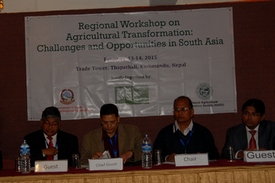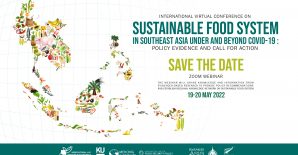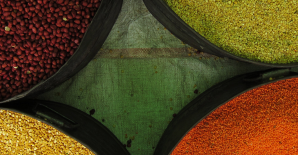This article was originally published on IFPRI South Asia website.
Eighty percent of the population in Nepal lives in rural areas and depends heavily on agriculture as a source of income and employment. With changing monsoon patterns, and the effect of drought and floods in various regions, the impact of climate change is visible in the agricultural food chain. Consequently, ensuring food security and farmers’ effective adaption to climate change is a major challenge for the policy makers.
Mindful of the challenges of food and nutritional security amid changing climatic conditions, a two-day conference was organized by International Food Policy Research Institute (IFPRI) and the Nepal Agricultural Economics Society (NAES) titled “Agricultural Transformation: Challenges and Opportunities in South Asia”, which took place from 11 to 12 February in Kathmandu, Nepal. In this event IFPRI led special session titled the “Convergences of Policies and Programs relating to Sustainable and Climate Resilient Agriculture”. The aim of the workshop was to showcase the studies and experiences in South Asian countries on agricultural transformation in general and climate-resilient agriculture in particular, and how they can learn from each other to formulate progressive and sustainable policies to promote climate-smart agriculture in a regional perspective.
Due to increasing urbanization and income, as well as changing dietary patterns, there is a higher demand for high value commodities combined with a visible decline in the demand for cereals. On the supply side, the agricultural sector makes up a lesser percentage of GDP, but the number of smallholder farmers is increasing. Agricultural growth needs to move from relying on cereals to producing more high-value commodities in order to adapt to changing consumer preference. Smallholders need to be connected with markets; however, they lack access to credit, information, insurance, and technology. There is also the risk of climate change, which needs to be mitigated in order to improve nutrition and food security.
Four themes emerged during the workshop. The first one focused on ensuring agricultural productivity and profitability to keep the sector competitive. Attention should also be paid to increasing farmers’ yields, using the private sector to promote the spread of ICT, fully harnessing the potential of current technology such as precision agriculture, and carrying out research on new technologies with enough return on investment so that policy makers are convinced to invest more in them.
The second theme was developing climate-resilient agriculture to tackle the emerging threat of climate change. Any approach should be integrated and cross-sectoral, and focus on food security, sustainability, production growth, and poverty reduction. The issue of an existing data gap between climate-smart technologies and their support was also raised. A need for a robust mechanism to implement climate-smart agriculture at the government level needs to be initiated.
The third theme focused on linking smallholders to markets. There was discussion on including the convergence of policies, institutions, technologies, and infrastructure; evolving policies and legal frameworks for linking farmers to markets (LFTM); creating a level playing field for private sector and facilitating growers’ associations; providing technology transfer mechanisms; and replicating successful LFTM models with local adaptation.
In the final theme, diversification of agriculture and the determinants of diversification from the demand side included urbanization and income growth; from the supply side, it included technology, fertilizer, labor, irrigation, and machinery; and enabling factors included extension, credit, infrastructure, and market access.
The workshop concluded with a Kathmandu Declaration, which included the following points:
- To have constant dialogue with policy makers and the government, industry, and NGOs on policy formulation
- The need to undertake research and analytical work and substantiate them with facts and figures
- Capacity building of agricultural economists in analytical techniques and policy analysis
- Networking within the country and the region among different professional associations for collaborative R&D studies
- The possibility of forming/organizing a South Asia agri-economics association
- A roster of experts to act as reviewers for publications
- Carry out research and organize conferences by identifying a topic/subject of common interest
- Explore funding for policy research
The IFPRI South Asia office, through the ReSAKKS-Asia project, is supporting many studies to understand the issues and challenges and seek sustainable solutions in agriculture. In this context, IFPRI organized a special session at the ASEAN Conference at Dhaka in September 2014 to discuss the impact of seed and fertilizer policies impacting smallholders. Later that year, IFPRI organized special sessions on converging policies and programs on climate-resilient agriculture in India in November and in Sri Lanka in December, 2014.
IFPRI - NAES Conference on Sustainable & Resilient Agriculture - David Spielman & Adam Kennedy - Innovation, competition, and productivity growth: from International Food Policy Research Institute




Leave a Reply